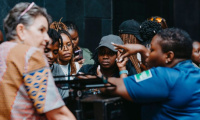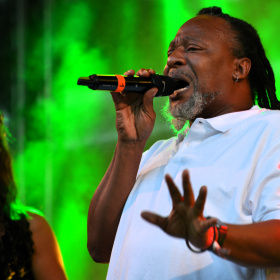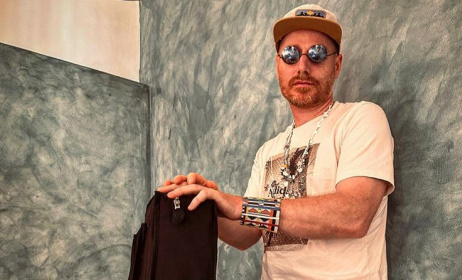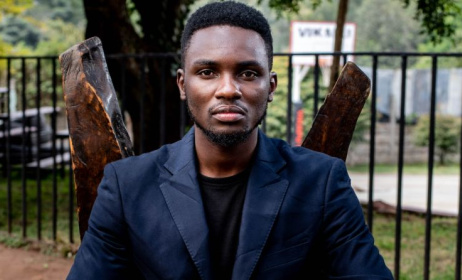Burundi musicians menaced, silenced and fleeing the country
By John Banram
Fear of being assassinated is spreading among artists and journalists in Burundi. No one dares to speak out or stand up any longer. An international arrest warrant (‘mandat d’arrêt’) with an undisclosed list of names was issued by the procureur general and has made everyone scared.
 Lion Story reggae band during a performance. Photo: www.flickr.com
Lion Story reggae band during a performance. Photo: www.flickr.com
Burundian artists are confronted with ever-shrinking possibilities for open and free political speech. Since April 2015, the central African country has been going through political turmoil. Well-known singers and band members are being targeted and, if possible, manipulated to change their artistic or political style. Several musicians have fled the country.
President Pierre Nkurunziza was to leave office at the end of his second term as enshrined in Burundi's Constitution. However, Nkurunziza disputed and overruled both the constitution and the Arusha agreements of year 2000, which had brought peace to the country that has been through more than three decades of civil war. In July 2015, he won a new term in office after a contested election which was boycotted by the opposition.
The last months since then have showed acts of violence and harsh repression against opposition members and civil society actors as well as media practitioners. Freedom of expression has been extremely limited, especially when five of the most popular private radio and television stations were attacked and burned during the month of May 2015.
With the closing down of these stations, the new and upcoming generation of Burundian artists lost their outlets. Some of the artists were also engaged in the campaign against the third term of the president, mainly through songs that informed and sensitized the people of Burundi in their local language. Some of these songs have been considered examples of expressions of hate speech, because they openly accuse and denounce the “others”.
Reggae band threatened
Apart from losing their main access to the airwaves, more is at stake for the musicians. Mentioning specific artists’ names poses danger under these circumstances. This article therefore has left out names of most artists at risk.
The story about the famous and popular reggae band Lion Story is already out there, though, in numerous articles, blog posts and YouTube video interviews. Long before the elections, in early 2015, Lion Story received regular threats because of the sharpness and openness of their lyrics.
Some of their well-known songs dealt – in a symbolic, but highly understandable way – with issues such as corruption, political killings and harassments of members of political parties and civil society members. Some of their songs were used as the soundtrack of the May and June protests that were organized by the youths in the urban suburbs of the capital Bujumbura, where most street protests took place.
On the other hand, it needs to be said that other songs also praised the president for all his results achieved during the last 10 years in power. With the political situation declining, week by week, the Burundian artists have been confronted with ever shrinking possibilities for open and free political speech. Due to the crisis almost no public concerts are being organized anymore, and in several areas, well-known singers and band members are being targeted and, if possible, manipulated to change their artistic or political style.
Those who participated and supported the president did profit financially, but were on the other hand looked upon as “enemies” of the opposition and civil society and as a consequence dropped from playlists at private radio stations.
Artists as vessels of truth
For most of the youngsters involved in artistic, musical expressions, fear has taken over their lives. They fear the ruling political party will engage its youth members against them, using violence to silence the critics. Why? Their songs could be seen as carriers of messages that inform about malpractices by the political parties.
By using a specific national youth language, the songs “deconstruct” the political narratives used by political spearheads, and they denounce manipulators at nation-wide level. By doing so, these songs have the potential to warn and sensitize rural, young, and vulnerable citizens about the psychological and manipulative narrative which politicians use to engage them upon acts of belonging to “us”, and acts of violence against “them” – the others, the traitors.
Fleeing to Uganda and UK
By the end of August 2015, the situation had evolved to a point that almost all artists are menaced in one way or another. Several musicians have fled abroad. Lion Story is probably the most famous one – “the prophet’s voice”, as they are often called, literally, in the local dialect.
Several of their songs are directly targeting the party in power, CNDD-FDD. All band members have fled Burundi. Seven members found refuge in Uganda. According to International Business Times, one of the members is currently seeking for political asylum in the United Kingdom.
Fleeing to the US and Kenya
Another artist has been declared an “enemy of the people” mainly because his most famous songs are openly denouncing the assassinations and act of corruption of the political leaders in Burundi. He survived three attacks already and is at present in the United States with no security if he returns home.
Authorities are allegedly searching for the man who organised a concert with a controversial singer in the Muramvya province during the month of March 2015.
An award-winning musician is currently being searched by the “Documentation”, which is the Burundian secret service, and this only for his song in which he refers to the need for politicians to first of all ask rural peasants their opinion before making any political decisions that are of concern to them. The singer recently fled to Kenya’s capital Nairobi.
Another singer, who is well-known for his cultural songs and expressions, used to perform in a karaoke type of bar in Bujumbura. He has several times been refused to perform within his own bar that is extremely close to the place where the Burundian president plays football on a daily basis.
Rumours go that they won’t let him perform anymore because he refused to sings songs of glory for the CNDD-FDD, the party of the president. He is also known for a very popular activist song in which he refers to some members of political parties who are “engaged in eating a lot themselves and never think of other that are hungry as well”. This particular singer was given the opportunity to participate in a musical festival in the United States, and he decided not to return to Burundi.
Engaged in political propaganda
More singers have been confronted with problems for refusing to sing for political parties or joining campaigns. In 2010, a singer, who currently lives in Canada, performed almost all the songs for the presidential campaign. He refused to engage in favour of the president in the recent campaign, as he felt deceived by the politics of recent years.
A similar story goes for a band which is known for their performances in the different karaoke bars of Bujumbura. Some members claim the band was obliged to perform songs in favour of president Nkurunziza. After having refused to perform, their bar was ordered to be closed down and some of the band members barely escaped personal attacks on them.
Since late August 2015, the two artists have been back in Burundi. “We did not flee,” they said, stating that they only went to Rwanda to “broaden their horizons.”
Fear of becoming a target
Yet another award-winning singer confirmed that he received threats, even without having composed songs with political connotations. He is related to a young movement leader of a coalition of youngsters that were campaigning against the third term of the president. The youth leader is currently in hiding in Rwanda.
Five more known artists as well as an unnumbered amount of singers that are performing profane and gospel music are travelling back and forth between Bujumbura and neighbouring Kigali, the capital of Rwanda. Although they are not menaced in Burundi, they leave their country mainly out of fear of what is going to happen in the near future.
A general fear has spread all over Burundi, and most musicians see themselves as one of the first that might become targets as the situation seem to be deteriorating and becoming increasingly dangerous. Most of them are in Rwanda, others in Uganda, and some are in the Democratic Republic of Congo or Tanzania.
To round off this long list of persecuted musicians, the most recent one that fell out of grace with the president is a composer and the singer of a hymn praising the political party CNDD-FDD. Opposed to the third candidature of the president, he as well has had to leave the country and is currently living in Holland.
Originally published on 28 September 2015 at Freemuse.org. Republished with permission.





























Comments
Log in or register to post comments